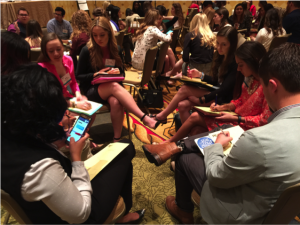Talent Development: How to Uplift Future Leaders [National Assembly Recap]
Session: Talent Development and How to Uplift Future Leaders
Presenter: Bonnie Upright APR, PRSA Board Liaison
Joshua Gordon, Vice President of Member Services
Victoria Lewis, Vice President of Advocacy
Sarah Johnson, Vice President of Professional Development
Gary Bridgens, Vice President of Chapter Development

Recap:
On her first day on the job at an agency, Bonnie Upright took her future into her own hands—literally. Her boss Del Galloway, APR, former PRSA chair, placed a PRSA membership packet into her hands and told her that she should join. Now, sixteen years later, Upright is a member of the PRSA Board of Director, PRSA Board Liaison for the PRSSA National Committee, and APR accredited. Upright’s talent got her to the top, but it was Galloway’s encouragement that enabled her to start her leadership journey.
Just like Galloway inspired Upright to reach her full potential, it is the responsibility of older PRSSA members to recognize the talents and potential in their Chapter’s younger members. Older students should look for those young superstars who display the characteristics of an effective public relations professional—ambition, enthusiasm, sincerity and willingness to participate. Then they should take that student under their wing and guide them to success.
“What Del did for me was that he really instilled in me the importance of having that mentor,” Upright said. “He believed in me and he supported me. It wasn’t just checking a box, but it was very much about empowering me.”
The best way for younger students to grow as leaders is to surround themselves with the right people. You should never be the smartest person in the room, Upright said.
“Putting yourself around super smart people does not mean you are weak, does not mean you don’t know,” Upright said. “Everyone has a specific skill set and something they will be good at. Part of being a good leader is recognizing that.”
This is where experienced older students can play a role. All upperclassmen should take the initiative to mentor their younger peers. Older students should recognize younger students’ talents, help them build their skills and ultimately be their best resource. Acting as a mentor will encourage these students to reach their full potential and become future leaders in the field.
Takeaways:
- Older students should recognize the potential and talent in younger students.
- Mentorship is a great way to encourage a young student to reach their full potential as a leader.
- Surround yourself with people from whom you can learn in order to develop your leadership skills.
- Encouragement, praise and recognition of talent go a long way to promote confidence in future leaders.
—
Bethany Corne is a sophomore majoring in public relations and marketing at The University of Alabama. She is the publications committee leader for UA PRSSA and a digital strategist for the Capstone Agency. Follow her on Twitter @BethanyyyC14, find her on LinkedIn or email her at bcorne@crimson.ua.edu.
